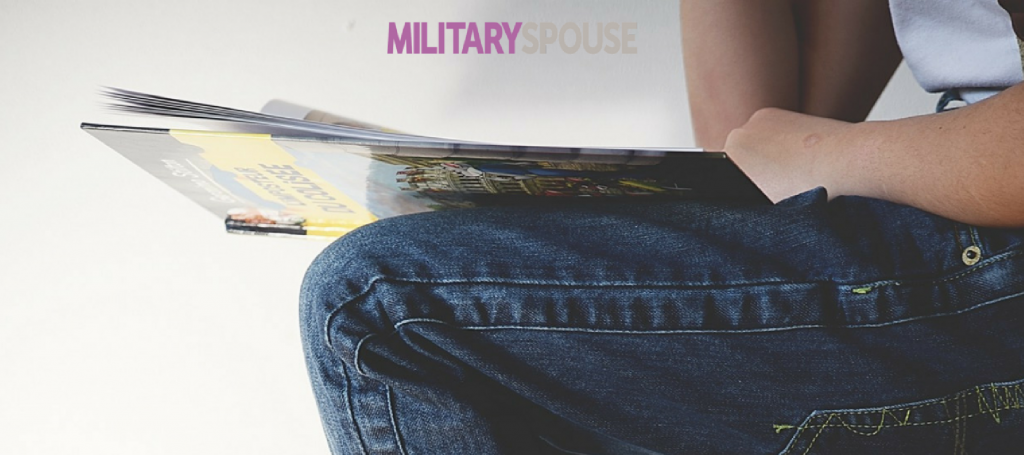Here at the edge of May, we can see June’s door beginning to open, inviting us to summer’s wide open spaces of free time and sunshine.
For many military families, it’s also inviting us to a lot of change. Some will PCS to a new duty station. Some will spend their first summer at their current duty station. Some will hug their service member before he or she deploys. Whatever the case, it’s likely that many will experience some form of adjustment.
If you have kids, then you know that when there’s change, a shift in children’s behavior is sure to follow. This shift isn’t necessarily bad or worrisome. In many cases it simply “is,” and it calls for some extra effort on our part to keep our children grounded and reassured.
Guess what:
Research shows that one simple activity can lead to a sense of stability and security, making it feel like your roots are firmly planted, even if you’re being decidedly uprooted: that activity is reading aloud.
Reading aloud strengthens the parent-child bond, opens lines of communication, and, when implemented routinely, provides an enjoyable activity that kids can depend on. Let’s take a look at how our military kids, specifically, can benefit:
1. Parent-Child Bonds
Snuggling with your kids behind a good book nurtures the bond you share with your children. When you read aloud on a couch, a bed or a mound of pillows, you are whisking your children away to an imagined land, inviting them to explore with you, laugh with you and dream with you. They will ask you questions, point to objects that catch their eyes and curiously explore the pictures.
Furthermore, as read-aloud expert Jim Trelease says in The Read Aloud Handbook, the sound of a parent’s voice reading to his or her children calms them, making them feel secure. Whether they are infants or middle schoolers, dealing with a deployment or a PCS, reading aloud can be an effective way to put our military kids at ease.
2. Lines of Communication
Reading aloud provides the opportunity for conversations to occur. When parents read a picture book, for example, they can pause and make comments about a picture, and then ask what their children think. If parents read a chapter book, they have an opportunity to sympathize with a character, and then ask for their child’s input.
These simple comments can lead to important conversations about real situations affecting our kids. They can give us insight on how our military kids think about the unique dynamics of our lifestyle, which gives us the chance to calm nerves, clear up confusion or – quite simply – empathize.
3. Reliable Activity
Bedtime is a popular read-aloud time slot for most families. Preserve this tradition, and find another 20-minute bloc during the day to devote to reading (feel free to make it longer).
There are two reasons for this, the first of which is associated with improved academic performance and a greater independent interest in reading. The second reason is that you are sending your children a message multiple times per day that reading is a good thing!
In his book, Trelease writes, “When we read to a child, we’re sending a pleasure message to the child’s brain. You could even call it a commercial, conditioning the child to associate books and print with pleasure.” So, even when military life is changing the world around them, routinely reading aloud to your kids will give them something beneficial and pleasurable they can depend on and anticipate with enthusiasm.
This summer, whether your kids are infants, middle schoolers or somewhere in between, make reading aloud a part of your daily routine. If you need some structure or guidance, check out a summer reading program offered by your local library. Barefoot Books and Scholastic also offer quality programs. PBSparents even gives guidelines for starting a summer book club for kids; what a great way to get your kids’ friends and their parents involved, too!
As you read, share your experiences and the books you’ve read. I’ve listed a small sample of titles here, which present themes relevant to military life, but this list is just a start. What books have you read to your kids that you found particularly special? Use the comments section to share your ideas. I’m eager to hear and read them myself. Happy reading!
All Ages
Barefoot Books World Atlas – Themes: exploration, appreciation of different cultures, travel
Infant-Age 3
Llama Llama Gram and Grandpa, by Anna Dewdney – Themes: sleeping away from home, finding comfort without Mom or Dad
Infant-Age 4
A House for Hermit Crab, by Eric Carle – Themes: moving, friendship
Ages 4-7
The Snail and the Whale, by Julia Donaldson – Themes: exploration, friendship, dreaming big
Ages 4-7
The Boy Who Grew Flowers, by Jen Wojtowicz – Themes: being new, friendship, empathy
Ages 8-11
Rain Reign, by Ann M. Martin – Themes: autism, being different, going outside your comfort zone, overcoming obstacles
Ages 9-11
Night of the Howling Dogs, by Graham Salisbury – Themes: friendship, leadership, teamwork, adventure, overcoming differences
[maxbutton id=”13″]


